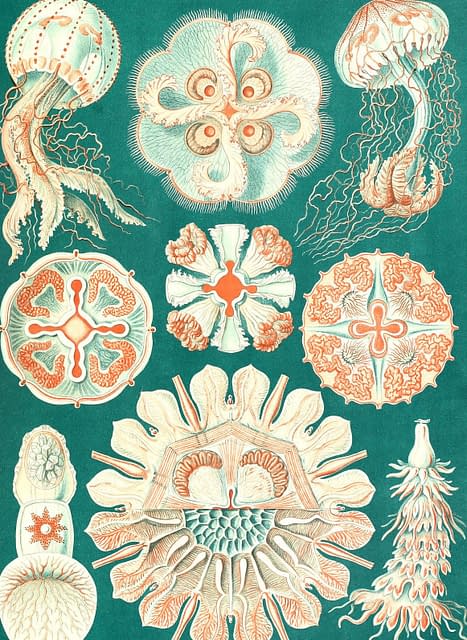Poetry The Ecstasy issue
Fragments From “Silent Mechanisms”
By Marcelo Morales
Translated from the SPANISH by KRISTIN DYKSTRA

On the sand there was an aguamala, jellyfish they call it in English, a fish made of gelatin. I remembered a poem by Tranströmer¹ where he writes about the meaning of words he scrawls in his notebook, half-asleep. When he wakes in the morning, the words lose their meaning, because there are things that like the jellyfish hold meaning only in their element. Outside it, the words were like medusae in sand . . .
“Marcelo, poke it. Isn’t it just seaweed?”
As I prodded the gelatin fish with a stick, I remembered having lived something similar, an old love, in another country, on another beach.
In contrast to the poem, that love radiated significance beyond its element.
As much as I want to deny it, my life happens through poetry, I explain the world to myself this way.
Loves that you carry inside always, as though they were imprisoned, like a DNA strand, like water inside a gelatin fish. Things without which life would have no meaning, things not solid yet strong.
“Poke it,” she said, “Isn’t it seaweed?”
“It looks like a membrane. The rest is air, only air.”
They say to a sick man, You’re fine, you’re fine. And still he’s dying. I clear the coffee table after breakfast. One book called Bright, another book by Sally Mann. Today I had an idea while driving, something about love, happiness, and the void; but not so boring or trite, something really new. Something showing itself for the first time in years. Craters opening in Siberia due to global warming. Ice disappears, they appear: the bones, furs, methane, permafrost. I took a gray body from a sardine tin, read lines written by a friend, bad ones. Lines like: if poetry doesn’t save you within your lifetime, do not expect salvation.
Your entire life lies behind. There’s some moment when you don’t make a full comeback, and aging begins. At dawn I open my eyes. The wireless phone, uncharged, is trying to communicate. It emits a sound . . .
I open the patio door. On top of the washer, the old electrical resistor from the Ocean heater.
Life doesn’t seem extraordinary, just because it is.
The ocean, moving in the night.
A bomb that doesn’t explode. An imaginary bomb, a real form of pressure.
It is, basically, I think, the passage of time. It is, basically, I think,
the rotation
of the earth.
Red chairs consisting of broken plastic. Pale light from the television, dust under the bed, car inside the garage, a motorcycle covered with a sheet, the blind closet moth on the curtain. Everything is fine. Like a perfect language, the mechanism, silent.
My heart thumps. We’re surrounded. Response brigades and police officers. They shut the electricity off. In front of the Ministry of Culture, young people are singing. Earlier this afternoon, in the same place, they were reading poetry. Something is wrong when that which is poetic becomes subversive. Power can be cold. Those of us who are older know that. Faces light up over cell phones, a sea of lights. Poetry, who said it was innocuous? Anguish. This must be collateral beauty. You go as far as the fear allows.
She is innocent, the little girl is innocent. Outside: politics, hunger strike, repression, simulation and dissidence. The dance of ego. The girl is innocent, she should stay that way. A hummingbird flew rapidly across the room. The girl is innocent, she doesn’t know fear. She should stay that way.
The soldiers in the street are silent, now they wear black. On television they’re talking about a soft coup d’état, about imperialism and the CIA, acts of financial sabotage out of Miami, the same old machinery.
Within the revolution all rights, outside the revolution, no rights.
In front of the ministry, they were reading Vallejo, singing Silvio and Santiago, they were singing Serrat.
There are things that you have to understand; for example, the center is minuscule in relation to everything else; for example, beauty happens off
to the side, when ugliness holds the center.
¹“If you take them out of the water their entire form / disappears, like when / an unspeakable truth is lifted up out of the silence.” “You might wake up during the night / and quickly throw some words down / on the nearest paper […] / (the words radiant with meaning!) but in the morning: the same words don’t say anything.” Tomas Tranströmer, from “Baltics”


